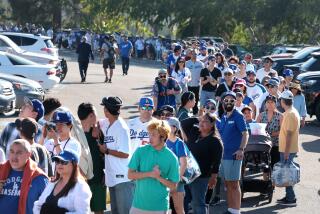NHL Drops the Ball, Not the Puck, and Few Notice
- Share via
So, the National Hockey League’s moronic players and equally moronic owners really did it.
The owners have locked out the players, claiming they can’t operate under the terms of the collective bargaining agreement that expired Wednesday.
The collective bargaining agreement, by the way, was forged in 1995 after the owners locked out the players for 105 days and canceled more than half of the 1994-95 season. That agreement had been renewed twice.
Now, the owners in a sport that is struggling mightily to keep its status as “major league” have threatened to shut the game down for as long as it takes -- the over-under seems to be the whole 2004-05 season -- to get a collective bargaining agreement that gives them “cost certainty” (standard sports owner code for salary cap).
Who should care that the greedy players and the stupid owners can’t figure a way to divide their substantial pie? It’s not exactly a new problem. And there are several blueprints out there: The NFL and its players figured out a solution more than 20 years ago. The NBA and its players figured it out, too.
And even Major League Baseball got a deal with its incredibly strong players union without a work stoppage in their last negotiations. (To be fair, MLB did cancel the World Series in 1994.)
The answer is, there’s not even one good reason to care.
This comes from a guy who saw his first NHL game in 1967 at the Spectrum in Philly, with Ed Giacomin’s Rangers beating Bernie Parent’s Flyers.
From a guy who had season tickets to the Philadelphia Blazers of the old World Hockey Association; who did color commentary for radio broadcasts of the Philadelphia Firebirds of the American Hockey League.
From somebody who got the manager of Reunion Arena in Dallas to call the NHL to inquire about playing host to the 1983 All-Star Game -- even though it would be 10 years before the North Stars would move to Texas from Minnesota.
From somebody who thinks that hockey at its highest level is the most exciting, exhilarating game there is; that skating backward (or forward, for that matter) at 30 mph and playing the puck off your skates and onto your stick -- without missing a stride -- is the hardest thing to do in all of sports.
(Much harder, by the way, than hitting a baseball. The argument that putting a round bat on a round ball is the most difficult thing to do in sports is so bogus: 6-year-old kids do it every day. And don’t give me that tired old line that being successful 30 percent of the time makes you a Hall of Famer. That’s bogus, too. Every major leaguer hits the ball more than 30 percent of the time, even Karim Garcia -- somebody’s just there to pick it up or catch it most of the time.)
From somebody who thinks no league’s postseason comes close to the passion and excitement that the NHL puts on for two months after the end of its nearly meaningless regular season.
Where do you think the NFL got the idea for the on-field awarding of the Vince Lombardi trophy after the Super Bowl? The NHL champions have been skating the Stanley Cup around the rink for all their fans to see since forever. It’s a case of one league adopting what works in another.
There’s no greater lesson to be learned here.
The owners want the players to help save them from themselves -- especially the four or five teams (including the Rangers, Flyers, Maple Leafs and Red Wings) that can afford to drive salaries into the stratosphere.
The NHL continually points to a report prepared by former Securities & Exchange Commission chairman Arthur Levitt -- and paid for by the owners -- which found that the league’s 30 teams lost a total of $273 million during the 2002-03 season on revenue of $1.996 billion. Some 75 percent of that revenue went to player costs, the report said, as opposed to about 65 percent for the NFL and MLB, and 58 percent for the NBA.
Nineteen teams had operating losses that season, averaging $18 million, and the 11 teams that made money averaged $6.4 million in profits, according to the report, which concluded that the “present business model of the National Hockey League is not economically viable.”
The NHL Players Association had no part in Levitt’s study, and here’s a shocker -- the members don’t believe it. Union president Bob Goodenow called it “simply another league public relations initiative.”
The players -- looking toward the Major League Baseball model rather than the NFL or NBA -- don’t want any type of artificial lid on salaries. They’d prefer a luxury tax on payrolls over a certain limit.
It’s an old story -- one that has produced strikes before in every major sport.
More to Read
Go beyond the scoreboard
Get the latest on L.A.'s teams in the daily Sports Report newsletter.
You may occasionally receive promotional content from the Los Angeles Times.






